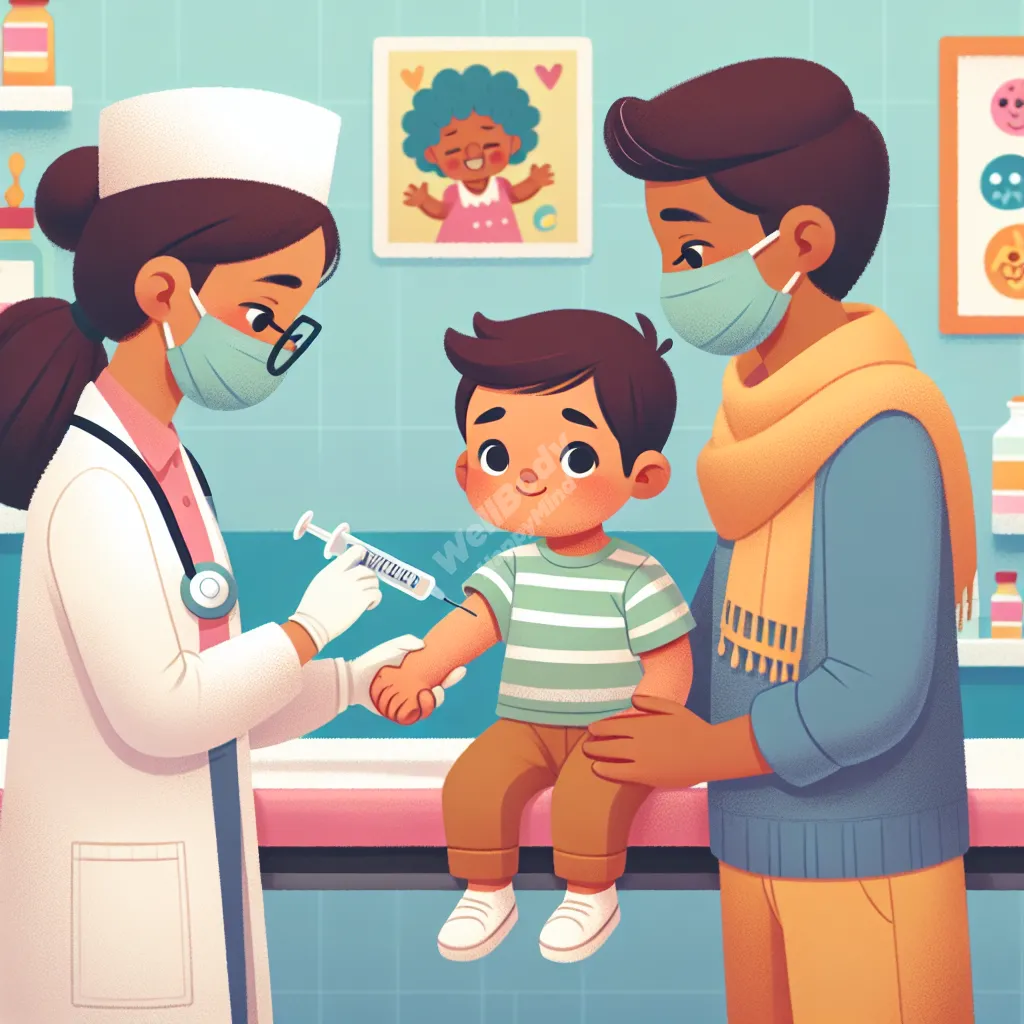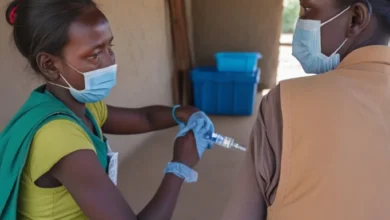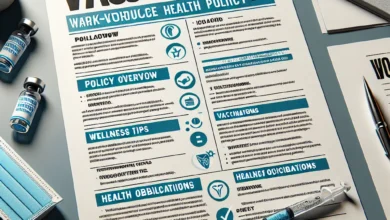A Step-by-Step Guide to Your Child’s Vaccination Schedule

I. Introduction
Did you know that vaccines have helped reduce infant deaths by an astonishing 60% over the past 50 years? This remarkable statistic highlights the crucial role vaccinations play in protecting our children’s health.
As a parent, navigating your child’s vaccination schedule can seem overwhelming, but it’s one of the most important steps you can take to safeguard their well-being.
In this blog post, we’ll provide a clear and easy-to-follow guide to help you understand and navigate your child’s immunization timeline. From birth to adolescence, we’ll break down the recommended pediatric vaccines at each stage, ensuring you have the knowledge to keep your little one protected against preventable diseases.
Let’s embark on this journey to secure a healthier future for your child!
II. Understanding Childhood Vaccinations
Vaccines are like special shields for your child’s body. They contain tiny, weakened parts of germs that help your child’s immune system learn to fight off diseases. When your child gets a vaccine, their body practices battling these harmless germ parts, so it’s ready to fight the real thing if it ever shows up.
Some of the diseases that routine childhood vaccinations prevent include:
- Measles
- Mumps
- Whooping cough
- Polio
- Hepatitis B
These illnesses can be very serious, but thanks to vaccines, they’re now much less common.
Following the recommended vaccination schedule is super important. It’s like a carefully planned road trip for your child’s health. This schedule is designed by experts to give the right protection at the right time.
When we stick to the schedule:
- We make sure your child is protected as early as possible
- We give vaccines when they work best for each age
- We keep your child safe from diseases that can be dangerous for little ones
Remember, each vaccine is a step towards a healthier future for your child and the community around them.
III. Newborn to 2 Months

When your baby first enters the world, their immune system is still developing. That’s why we start protecting them right away!
At birth, most babies receive their first vaccine:
- Hepatitis B: This vaccine helps protect against a serious liver disease.
As you prepare for your baby’s 2-month check-up, it’s normal to feel a bit nervous. But remember, these vaccines are keeping your little one safe from some pretty tough illnesses.
At 2 months, your baby will typically receive these vaccines:
- DTaP: Protects against diphtheria, tetanus, and pertussis (whooping cough)
- IPV: Shields against polio
- Hib: Guards against Haemophilus influenzae type b
- PCV13: Defends against pneumococcal disease
- RV: Protects against rotavirus
It might seem like a lot, but each vaccine is carefully chosen to protect your baby when they’re most vulnerable. Your doctor will guide you through the process and answer any questions you might have.
Remember, it’s okay to feel a bit overwhelmed. You’re doing a great job keeping your baby healthy!
IV. 4 Months to 6 Months

As your baby grows, their immune system gets stronger, but it still needs help. Let’s look at the vaccines your little one will typically receive during this period.
At 4 months, your baby will usually get these vaccines:
- DTaP: Second dose
- IPV: Second dose
- Hib: Second dose
- PCV13: Second dose
- RV: Second dose
These are mostly booster shots of the vaccines your baby received at 2 months. They help reinforce your baby’s protection against these diseases.
At 6 months, the vaccination schedule typically includes:
- DTaP: Third dose
- Hib: Third dose (depending on the brand used)
- PCV13: Third dose
- RV: Third dose (if needed, depending on the brand used)
- Hepatitis B: Third dose (can be given between 6-18 months)
- IPV: Third dose (can be given between 6-18 months)
An exciting milestone at 6 months is the introduction of the flu vaccine. The flu can be serious for babies, so it’s recommended that children 6 months and older get a flu shot every year.
Remember, each of these vaccines is like a building block, strengthening your baby’s defense system against harmful diseases. You’re doing a great job protecting your little one!
V. 12 Months to 18 Months

As your baby becomes a toddler, their immune system continues to develop. This period brings some new vaccines and important boosters.
At 12 months, your child will typically receive:
- MMR: Protects against measles, mumps, and rubella
- Varicella: Guards against chickenpox
- Hep A: First dose to protect against Hepatitis A
- PCV13: Fourth dose
Between 15-18 months, your child will usually get:
- DTaP: Fourth dose
- Hib: Final dose
During this time, your child may also receive any catch-up doses of previous vaccines if needed.
The importance of booster shots can’t be overstated. They’re like giving your child’s immune system a refresher course. Boosters help maintain and strengthen the protection provided by earlier doses.
Some key points to remember:
- These vaccines protect against serious diseases that can still occur in children.
- The timing of these shots is carefully planned for maximum effectiveness.
- It’s normal for your child to experience mild side effects, like soreness or low-grade fever.
By keeping up with these vaccinations, you’re giving your child the best protection possible as they grow and explore the world around them. Great job, parents!
VI. Preschool Years (2-4 Years)
As your child enters the preschool years, their immune system is much stronger, but still needs some help. This period focuses on reinforcing previous vaccinations and introducing a few new ones.
Between 2-3 years, your child may receive:
- Hep A: Second dose (if not given earlier)
- Flu shot: Remember, this is an annual vaccine
At 4 years, it’s time for several important booster shots:
- DTaP: Fifth dose
- IPV: Fourth dose
- MMR: Second dose
- Varicella: Second dose
These boosters are crucial because they:
- Strengthen your child’s immunity
- Provide longer-lasting protection
- Ensure your child is ready for school entry
Preparing your child for school entry vaccinations:
- Talk to your child about the importance of vaccines in simple terms
- Use positive language and avoid scary words
- Consider bringing a comfort item to the appointment
- Plan a small reward or fun activity after the vaccination
Remember, these vaccines are not just for your child’s protection, but also for the safety of their future classmates and teachers. You’re helping to create a shield of protection around your community!
By keeping up with these vaccinations, you’re setting your child up for a healthy start to their school years. Well done, parents!
VII. School-Age and Adolescent Vaccinations
As your child grows into their preteen and teen years, their immune system is more mature, but new challenges arise. This stage focuses on long-term protection and addressing age-specific health concerns.
At 11-12 years, your child will typically receive:
- Tdap: A booster for tetanus, diphtheria, and pertussis
- HPV: Human Papillomavirus vaccine (2-dose series)
- MenACWY: Meningococcal conjugate vaccine
The importance of the HPV vaccine:
- Protects against several types of cancer
- Most effective when given before exposure to the virus
- Safe and provides long-lasting protection
Catch-up vaccinations for older children and teens:
- If your child has missed any earlier vaccines, this is a good time to catch up
- Your healthcare provider can create a personalized catch-up schedule
- Some vaccines, like hepatitis B, can still be given if missed earlier
Key points to remember:
- These vaccines protect against serious diseases that can affect teens and adults
- They’re timed to provide protection before potential exposure risks increase
- It’s normal for preteens and teens to have questions – encourage open discussions
By keeping up with these vaccinations, you’re helping your child transition safely into adulthood. You’re not just protecting their health now, but potentially for decades to come. Great job in continuing to prioritize your child’s health!
VIII. Keeping Track of Your Child’s Vaccinations

Staying on top of your child’s vaccination schedule is crucial for their health. Here are some tips to help you keep everything organized:
Tips for maintaining vaccination records:
- Keep a physical vaccination card:
- Ask for one at your child’s first doctor visit
- Bring it to every appointment
- Store it in a safe, easily accessible place
- Use digital health apps:
- Many offer vaccination tracking features
- Set reminders for upcoming shots
- Some can sync with your healthcare provider’s records
- Create a digital backup:
- Take photos of your child’s vaccination card
- Store them securely in cloud storage
Importance of communicating with healthcare providers:
- Regular check-ins: Schedule and attend all recommended well-child visits
- Ask questions: Don’t hesitate to discuss any concerns about vaccines
- Update information: Inform your provider of any vaccines received elsewhere (e.g., flu shots at pharmacies)
Remember:
- Accurate records are important for school enrollment and travel
- They help avoid unnecessary repeat vaccinations
- Good record-keeping ensures your child stays on schedule
By staying organized and maintaining open communication with your healthcare provider, you’re ensuring your child receives timely and appropriate vaccinations. Great job in being a proactive parent!
IX. Addressing Common Concerns
It’s natural to have questions about your child’s vaccinations. Let’s address some common concerns:
Vaccine Safety:
- Vaccines undergo rigorous testing before approval
- They are continuously monitored for safety
- The benefits of vaccines far outweigh the risks of vaccine-preventable diseases
Dealing with Side Effects:
Most side effects are mild and short-lived. Common ones include:
- Soreness at the injection site
- Low-grade fever
- Mild fussiness
To help your child:
- Use a cool, damp cloth on the injection site
- Give age-appropriate doses of acetaminophen or ibuprofen if needed
- Offer plenty of fluids and rest
Importance of Adhering to the Schedule:
- The schedule is designed to provide protection when your child needs it most
- Delaying vaccines leaves your child vulnerable to serious diseases
- Following the schedule ensures the best immune response
Remember:
- It’s okay to have concerns – discuss them with your healthcare provider
- Reliable information is key – use trusted sources like the CDC or WHO
- Your child’s health and safety are the top priority
By addressing these concerns and following the recommended schedule, you’re making an informed decision to protect your child’s health. You’re doing a great job in navigating this important aspect of parenting!
X. Special Considerations
While the standard vaccination schedule works for most children, there are some special situations to be aware of:
Vaccinations for children with certain health conditions:
- Some conditions may require:
- Additional vaccines
- Modified schedules
- Avoiding certain vaccines
- Examples include:
- Children with weakened immune systems
- Those with severe allergies
- Kids with chronic health conditions
Always consult your healthcare provider about your child’s specific needs.
Travel vaccinations:
- If planning international travel:
- Check CDC recommendations for your destination
- Schedule a travel clinic appointment well in advance
- Some vaccines may need multiple doses over time
- Common travel vaccines include:
- Hepatitis A
- Typhoid
- Yellow Fever (for certain regions)
Catch-up schedules for missed vaccinations:
- It’s never too late to catch up
- Your provider can create a personalized plan
- Some vaccines may be given in a compressed timeframe
Key points to remember:
- Each child’s situation is unique
- Regular communication with your healthcare provider is crucial
- Flexibility in the vaccination schedule can accommodate special needs
By considering these special circumstances, you’re ensuring your child receives the most appropriate protection for their individual situation. Great job in being attentive to your child’s specific health needs!
XI. Conclusion

As we wrap up our journey through your child’s vaccination schedule, let’s recap the key points:
- Vaccinations are crucial for protecting your child’s health and the health of your community.
- The recommended schedule is carefully designed to provide optimal protection at the right times.
- Staying informed and following the schedule is one of the most important things you can do as a parent.
Remember:
- Each vaccine is a step towards a healthier future for your child.
- Regular check-ups and open communication with your healthcare provider are essential.
- It’s normal to have questions – always seek information from reliable sources.
By following the recommended vaccination schedule, you’re giving your child the best possible start in life. You’re not just protecting them from serious diseases, but also contributing to the overall health of your community.
Keep up the great work, parents! Your commitment to your child’s health through vaccination is a powerful act of love and protection.
Certainly! I’ll rewrite the Additional Resources section with links included:
XII. Additional Resources
To help you stay informed and up-to-date, here are some reliable sources for vaccine information:
- Centers for Disease Control and Prevention (CDC):
- Offers comprehensive, up-to-date vaccination schedules
- Provides detailed information on each vaccine
Visit CDC Immunization Schedules - World Health Organization (WHO):
- Offers global perspective on vaccinations
- Provides information on vaccine safety and research
Visit WHO Vaccines and Immunization - American Academy of Pediatrics (AAP):
- Offers resources specifically for parents
- Provides age-specific health information
Visit AAP Immunization Resources - Immunization Action Coalition (IAC):
- Provides educational materials for healthcare professionals and the public
- Offers a comprehensive vaccine information website
Visit IAC Website - Vaccine Education Center at Children’s Hospital of Philadelphia:
- Offers in-depth information about vaccines and the diseases they prevent
- Provides answers to common vaccine questions
Visit Vaccine Education Center
Remember, these resources are meant to supplement, not replace, the advice of your healthcare provider. Always consult with your child’s doctor for personalized guidance on vaccinations.
By using these trusted resources, you’re equipping yourself with the knowledge to make informed decisions about your child’s health. Great job in taking an active role in your child’s well-being!



